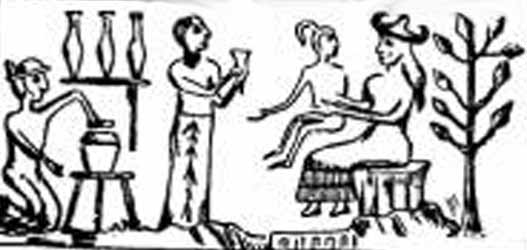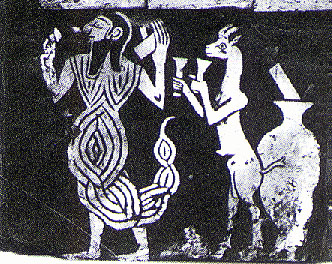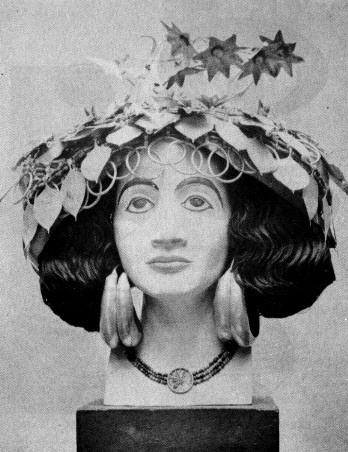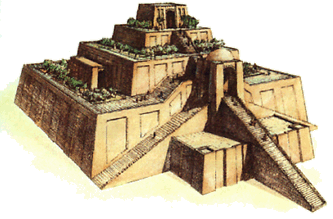
Preparing for Class:
September 12

 The Epic of Gilgamesh, Tablets 9-11
The Epic of Gilgamesh, Tablets 9-11
- Before the death of Enkidu, Gilgamesh
tried to comfort his friend by assuring him that he would be remembered. Does
Gilgamesh believe his own words?

- Tablet 9 is basically a fantastic
journey. Why have the location and the people gotten so exotic? What does
this mean to you?
- Scorpion
men belong to the realm of mythological creatures. They were composite
creatures, that is part human, part animal, and they occasionally helped human-kind.
Such creatures and demons can also be frightful and dangerous to humans. They
are not portrayed consistently as being either beneficial or dangerous in
Mesopotamian literature and art. A representation of a scorpion man (image
to the right) appears on the soundbox of a harp from the royal cemetery at
Ur (Early Dynastic period).
-
Tablet 10 relates
Gilgamesh's encounter with the tavern keeper and tells how he finally reaches
Utanapishtim. What narrative devices does the author use to emphasize the
passage of time and the distance covered?
- What is the barmaid's advice
to Gilgamesh? Do you agree with her?
-
How many narratives
can you think of where the hero has to trust a mysterious ferryman to take
him to his (usually super natural)
destination?
natural)
destination?
- Many of you are studying to be
engineers. What would Utanapishtim's "ark" look like?
- What do you think about Utnapishtim
as a heroic figure? How does he earn his immortality?
- After Utanapishtim tells Gilgamesh
the story of the flood, he tests Gilgamesh. How does he do this and what is
the result?
- After you've read tablet 9-11
of Gilgamesh, read Genesis chapter
6, chapter
7, chapter
8, and chapter
9. Both tell of a great flood that wipes out mankind, but the underlying
meanings of the two stories are very different. Be prepared to discuss the
different outlooks that these stories represent: why is mankind wiped out?
how do (does) the gods (god) react to the destruction?
- Gilgamesh gets one chance at immortality.
What is it and who is responsible for giving it to him?
- Who foils Gilgamesh's attempt?
Does this remind you of anything?
- The poem ends the same way it
begins. What do you think the conclusion means? What does the author think
is the answer to Gilgamesh's problem? What is man's lot in life and what hope
does he have for immortality?

Return to Daily
Readings and Assignments Page
Return to Home
Page



 The Epic of Gilgamesh, Tablets 9-11
The Epic of Gilgamesh, Tablets 9-11 
 natural)
destination?
natural)
destination?